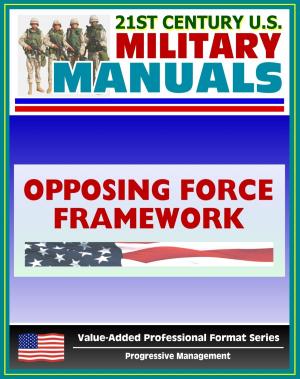21st Century FEMA Study Course: Fundamentals of Emergency Management (IS-230.a) - Integrated EMS, Incident Management, Case Studies, Prevention, Preparedness, Response, Recovery, Mitigation
Nonfiction, Social & Cultural Studies, Political Science| Author: | Progressive Management | ISBN: | 9781466199583 |
| Publisher: | Progressive Management | Publication: | July 1, 2011 |
| Imprint: | Smashwords Edition | Language: | English |
| Author: | Progressive Management |
| ISBN: | 9781466199583 |
| Publisher: | Progressive Management |
| Publication: | July 1, 2011 |
| Imprint: | Smashwords Edition |
| Language: | English |
This Federal Emergency Management Agency (FEMA) independent training course manual from the Emergency Management Institute (EMI) introduces the fundamentals of emergency management as an integrated system, surveying how the resources and capabilities of all functions at all levels (federal, state, local, private sector) can be networked together in all phases for all hazards. It is one in the Federal Emergency Management Agency (FEMA) Professional Development Series. This course was previously titled “Principles of Emergency Management.” The title was changed to reflect the content and intent of the course.
At the conclusion of this course, the participant should be able to:
* Explain the all-hazard emergency management process that integrates the resources of local, tribal, State, and Federal governments and voluntary and business assets.
* Explain the local, tribal, State, Federal, and individual and family roles in emergency management.
* Explain what individuals and families can do to protect themselves in emergencies.
* Describe the elements of an emergency management program.
* Discuss the role of individuals and organizations, as well as their relationships with one another, in emergency management.
* Explain the importance of networking to emergency management.
* Explain the social, political, and economic implications of a disaster.
* Describe alternate models for organizing emergency management programs.
This entry-level course is designed for individuals new to the field of emergency management or persons with a desire to understand the fundamentals of emergency management.
This is a privately authored news service and educational publication of Progressive Management.
This Federal Emergency Management Agency (FEMA) independent training course manual from the Emergency Management Institute (EMI) introduces the fundamentals of emergency management as an integrated system, surveying how the resources and capabilities of all functions at all levels (federal, state, local, private sector) can be networked together in all phases for all hazards. It is one in the Federal Emergency Management Agency (FEMA) Professional Development Series. This course was previously titled “Principles of Emergency Management.” The title was changed to reflect the content and intent of the course.
At the conclusion of this course, the participant should be able to:
* Explain the all-hazard emergency management process that integrates the resources of local, tribal, State, and Federal governments and voluntary and business assets.
* Explain the local, tribal, State, Federal, and individual and family roles in emergency management.
* Explain what individuals and families can do to protect themselves in emergencies.
* Describe the elements of an emergency management program.
* Discuss the role of individuals and organizations, as well as their relationships with one another, in emergency management.
* Explain the importance of networking to emergency management.
* Explain the social, political, and economic implications of a disaster.
* Describe alternate models for organizing emergency management programs.
This entry-level course is designed for individuals new to the field of emergency management or persons with a desire to understand the fundamentals of emergency management.
This is a privately authored news service and educational publication of Progressive Management.















